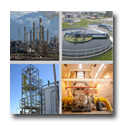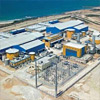Desalination can be used for partial removal of dissolved solids making the water fit for human consumption or the process can remove all solids thereby producing very high purity water for use in turbines and other industrial processes.
The need for desalination is perhaps more understood when we realise that it requires:
Over 200,000 litres of water to produce 1 metric tonne of aluminium
-Over 50,000 litres of water to produce 1 metric tonne of petrol
-Over 1,000 litres of water to produce 1 metric tonne of industrial fibres
It can been seen that the worlds natural supply of fresh water would not meet the needs of the worlds demand for industrial products and hence the introduction of desalination.
There are many different types of desalination processes each one with its own attributes and each one playing a vital role in the production of the worlds need for fresh water.
The main processes are Multi Stage Flash Desalination; Reverse Osmosis; Electro-dialysis; Circulation vapour; Long tube distillation.
Of the major processes available, Multi-Stage Flash is the most widely used, producing about 60% of the worlds production of desalinated water.
The principle of Multi-Stage flash is similar to that of boiling a kettle in which steam is produced which condenses to give pure water.
Apply vacuum to the system and the heated water spontaneously turns to water vapour., on other words it ‘flashes’
In a Multi-Stage Unit the pressure in a section is lower than the previous one thereby maximising the production of the fresh water and allowing greater heat recovery and hence economic production of the fresh water.
The major users are in countries that do not have adequate sources of fresh water such as the Middle East, and countries where the demand for very pure water is extremely high such as in the Silicon Valley in California.
Looking further into the future, solar powered systems are being developed to provide the energy needed to run such plants.
Corrosion Control
The major problem in the efficient functioning of a Multi Stage Flash Desalination Plant is the lost downtime due to the ravages of corrosion.
Whereas pipes and fittings are relatively inexpensive to repair or replace, the cost of a pump or valve can be very high.
It is for this reason that the valves and pumps used must fall under the following criteria.
1.The valve must be corrosion resistant to the aggressive media and chemicals found on a Multi Stage Desalination Plant
2.The Valve must be easy to maintain
3.The valve must be highly reliable under the most arduous conditions
4.the valve must be cost effective.
It is for these reasons above that Diaval Diaphragm Valves, with its multitude of material and diaphragm combinations have become the plant Engineers first choice.
Diaval Diaphragm Valves offer:
* Linings suitable to withstand the ravages of corrosion posed by the salt water and chemicals encountered in the process.
* Diaval Diaphragm Valves offer ease of maintenance thereby reducing unscheduled downtime
* Diaval diaphragm Valves are 100% leak tight.. a necessity when dealing with vacuum conditions
* Actuated Diaval Diaphragm Valves can be serviced in-line without the need of removing the valve from the line.
The use of Diaval Diaphragm Valves reduces downtime, increases safety and reduces the need for large stocks of spare parts.
Multi-Stage Flash Desalination Plant
Some of the valve combinations used on the plant.
Service |
Valve Type |
Body Material |
Body Lining |
Diaphragm |
Size Range |
Sea Water |
Diaval
Diaphragm
Valve |
Ductile Iron |
Natural Rubber |
Natural Rubber |
150 mm
to 350 mm |
Condensate |
Diaval
Diaphragm
Valve |
Ductile Iron |
Butyl Rubber |
Butyl Rubber |
100mm
to 250mm |
Brine Discharge |
Diaval
Diaphragm
Valve |
Ductile Iron |
Unlined |
Butyl Rubber |
200mm
to 300mm |
Caustic Addition |
Diaval
Diaphragm Valve |
Ductile Iron |
Butyl Lined |
Butyl Lined |
25mm
to 50mm |
Chlorine Injection |
Diaval
Diaphragm
Valve |
Ductile Iron |
ETFE
or PFA Lined |
PTFE/Viton |
25mm
to 50mm |
Note:
Use of a Viton sealed bonnet assembly is recommended on the Chlorine and Caustic valves.
Users Of Diaval Diaphragm Valves On Desalination Installations:
- Metito UAE
- Saline water Conversion Corporation
- Ministry Of Electricity & Water (UAE)
|





